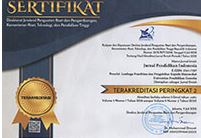Correlation of Breakfast with Learning Concentration in Fourth Grade Elementary School
DOI:
https://doi.org/10.23887/jpai.v6i3.52275Keywords:
Breakfast, Study Concentration, Elementary SchoolAbstract
The students really need nutritional intake therefore breakfast is very important for them. Children who are accustomed to breakfast will have better abilities than children who are not accustomed to breakfast. Breakfast will stimulate growth and maximize children's abilities at school. This study aims to analyze the correlation of breakfast with the learning concentration of fourth grade elementary school students. The method used in this research is a survey method by conducting treatments in data collection, by distributing questionnaires, tests, structured interviews, and so on. This study uses a descriptive approach. The subjects in this study were 24 students including 11 male students and 13 female students. While the research stages are: 1) Documentation; 2) Questionnaire (Questionnaire preparation, Questionnaire Validity Test, Questionnaire Reliability Test. The instrument or measuring instrument used is the Likert Scale and the data analysis technique used is using "significant test" the correlation test can analyze how the relationship between x and y variables. To calculate item analysis and correlation, the product moment correlation coefficient formula is used. The results of the research show that the correlation between Breakfast and Learning Concentration results in the number 0.987 where the resulting number is positive. This shows that there is a very close relationship between Breakfast and Student Learning Concentration. Based on the results of the correlation analysis, the hypothesis proposed is that there is a relationship between breakfast and student concentration. It means that there is a very significant relationship between breakfast and the learning concentration of fourth grade elementary school students.
References
Aini, D. F. N. (2018). Self Esteem pada Anak Usia Sekolah Dasar untuk Pencegahan Kasus Bullying. Jurnal Pemikiran Dan Pengembangan Sekolah Dasar (JP2SD), 6(1), 36–46. https://doi.org/10.22219/jp2sd.v6i1.5901. DOI: https://doi.org/10.22219/jp2sd.v6i1.5901
Al-Faida, N. (2021). Pengaruh Kebiasaan Sarapan Terhadap Konsentrasi Belajar Mahasiswa Stikes Persada Nabire Provinsi Papua. Jurnal Ilmu Kesehatan Masyarakat, 17(2), 81–86. https://doi.org/10.19184/ikesma.v17i1.22397. DOI: https://doi.org/10.19184/ikesma.v17i1.22397
Alamin, R. L., & Syamsianah, A. (2014). Hubungan Sarapan Pagi di Rumah dan Jumlah Uang Saku Dengan Konsumsi Makanan Jajanan di Sekolah Pada Siswa SD N Sukorejo 02 Semarang. Jurnal Gizi, 3(1). https://doi.org/10.26714/jg.3.1.2014.%25p.
Alfarisi, R., Yuniastini, Y., Pinilih, A., & Jauhari, P. N. O. (2020). Kebiasaan Sarapan Pagi dengan Prestasi Belajar Siswa SD Negeri 01 Rajabasa Bandar Lampung. Jurnal Ilmiah Kesehatan Sandi Husada, 9(1), 164–169. https://doi.org/10.35816/jiskh.v11i1.237. DOI: https://doi.org/10.35816/jiskh.v11i1.237
Apriani, D. G. Y. (2022). Hubungan Sarapan Pagi Dengan Tingkat Konsentrasi Belajar Pada Anak Kelas 4-6 Sekolah Dasar Negeri 1 Tiyinggading. Jurnal Medika Usada, 5(1), 16–21. https://doi.org/10.54107/medikausada.v5i1.115. DOI: https://doi.org/10.54107/medikausada.v5i1.115
Astuti, D., Susilo, G., & Sari, T. H. N. I. (2018). Pengaruh Konsentrasi Belajar Dan Kemandirian Belajar Terhadap Hasil Belajar Matematika Siswa Kelas XI SMA Negeri 2 Balikpapan Tahun Ajaran 2017/2018. De Fermat : Jurnal Pendidikan Matematika, 1(2), 42–53. https://doi.org/10.36277/defermat.v1i2.25. DOI: https://doi.org/10.36277/defermat.v1i2.25
Coleman, B. D., & Fuoss, R. M. (2017). Quaternization Kinetics. I. Some Pyridine Derivatives in Tetramethylene Sulfone. Journal of the American Chemical Society, 77(21), 5472–5476. https://doi.org/10.1021/ja01626a006. DOI: https://doi.org/10.1021/ja01626a006
Hanik, N. R., Harsono, S., & Nugroho, A. A. (2018). Penerapan Pendekatan Contextual Teaching and Learning dengan Metode Observasi untuk Meningkatkan Hasil Belajar pada Matakuliah Ekologi Dasar. Jurnal Pendidikan Matematika Dan IPA, 9(2), 127–138. https://doi.org/10.26418/jpmipa.v9i2.26772. DOI: https://doi.org/10.26418/jpmipa.v9i2.26772
Hanim, B., Ingelia, I., & Ariyani, D. (2022). Kebiasaan Sarapan Pagi dengan Status Gizi Anak Sekolah Dasar. Jurnal Kebidanan Malakbi, 3(1), 28–35. https://doi.org/10.33490/b.v3i1.570. DOI: https://doi.org/10.33490/b.v3i1.570
Hariyanto. (2010). Hubungan Status Gizi dengan Prestasi Belajar Siswa Sekolah Dasar Negeri 01 Guguk Malintang Kota Padangpanjang. Jurnal Kesehatan Andalas, 3(3). http://jurnal.fk.unand.ac.id/index.php/jka/article/view/176.
Ikawati, M. P. D. (2015). Upaya Meningkatkan Konsentrasi Belajar Siswa KMS (Kartu Menuju Sejahtera) Menggunakan Konseling Kelompok Bagi Siswa. Psikopedagogia Jurnal Bimbingan Dan Konseling, 4(2), 158. https://doi.org/10.12928/psikopedagogia.v4i2.4484. DOI: https://doi.org/10.12928/psikopedagogia.v4i2.4484
Lasidi, O. D., & Umboh, A. (2018). Hubungan Status Gizi Dan Kualitas Sarapan Pagi Dengan Prestasi Belajar Siswa Kelas Iv Dan V Di Sd Negeri 21 Manado. JURNAL KEPERAWATAN, 6(1). https://ejournal.unsrat.ac.id/index.php/jkp/article/download/19491/19041.
Mariza, Y. Y., & Kusumastuti, A. C. (2013). Hubungan antara kebiasaan sarapan dan kebiasaan jajan dengan status gizi anak sekolah dasar di Kecamatan Pedurungan Kota Semarang. Journal of Nutrition College, 2(1), 207–213. https://ejournal3.undip.ac.id/index.php/jnc/article/view/2108. DOI: https://doi.org/10.14710/jnc.v2i1.2108
Marquezin, M. C. S., Pedroni-Pereira, A., Araujo, D. S., Rosar, J. V., Barbosa, T. S., & Castelo, P. M. (2016). Descriptive Analysis of the Masticatory and Salivary Functions and Gustatory Sensitivity in Healthy Children. Acta Odontologica Scandinavica, 1–6. https://doi.org/http://dx.doi.org/10.1080/00016357.2016.1191085. DOI: https://doi.org/10.1080/00016357.2016.1191085
Muchtar, M., Julia, M., & Gamayanti, I. L. (2011). Sarapan dan jajan berhubungan dengan kemampuan konsentrasi pada remaja. Jurnal Gizi Klinik Indonesia, 8(1), 28–35. https://core.ac.uk/download/pdf/296266129.pdf. DOI: https://doi.org/10.22146/ijcn.17728
Mulyana, O. P., Izzati, U. A., & Puspitadewi, N. W. S. (2013). Penerapan Relaksasi Atensi Untuk Meningkatkan Konsentrasi Belajar Pada Siswa Smk. Jurnal Psikologi Teori Dan Terapan, 3(2), 103. https://doi.org/10.26740/jptt.v3n2.p103-112. DOI: https://doi.org/10.26740/jptt.v3n2.p103-112
Nisa, N. H. P. K., & Arifin, M. B. U. B. (2021). Pengaruh Kebiasaan Sarapan Pagi Terhadap Konsentrasi dan Hasil Belajar Bahasa Jawa Kelas 5 MINU Durung Bedug Candi Sidoarjo. Didaktis: Jurnal Pendidikan Dan Ilmu Pengetahuan, 21(2). https://doi.org/10.30651/didaktis.v21i2.7598. DOI: https://doi.org/10.30651/didaktis.v21i2.7598
Noviyanti, R. D., & Kusudaryati, D. P. D. (2018). Hubungan Kebiasaan Sarapan Pagi Dengan Prestasi Belajar Siswa SD Muhammadiyah Program Khusus Surakarta. Profesi (Profesional Islam): Media Publikasi Penelitian, 16(1), 72–77. https://doi.org/10.26576/profesi.302. DOI: https://doi.org/10.26576/profesi.302
Perdana, F., & Hardinsyah, H. (2013). Analisis Jenis, Jumlah, dan Mutu Gizi Konsumsi Sarapan Anak Indonesia. Jurnal Gizi Dan Pangan, 8(1), 39–46. DOI: https://doi.org/10.25182/jgp.2013.8.1.39-46
Puspitasari, T. O., Putri, Y. E., & Yohanes, Y. (2019). Sikap Terhadap Konsentrasi Belajar Siswa Pada Mata Pelajaran Fisika di Sekolah Menengah Atas. JIPFRI (Jurnal Inovasi Pendidikan Fisika Dan Riset Ilmiah), 3(2), 79–85. https://doi.org/10.30599/jipfri.v3i2.537. DOI: https://doi.org/10.30599/jipfri.v3i2.537
Rafika, P. A., & Susana, S. (2018). Hubungan Kebiasan Sarapan Pagi Dengan Konsentrasi Pada Remaja. Jurnal Ilmiah Obstetri Gynekologi Dan Ilmu Kesehatan, 6(2). https://jurnal.unitri.ac.id/index.php/biomed/article/view/2426.
Rahmiwati, A. (2014). Hubungan Sarapan Pagi Dengan Prestasi Belajar Siswa Sekolah Dasar. Jurnal Ilmu Kesehatan Masyarakat, 5(3). http://ejournal.fkm.unsri.ac.id/index.php/jikm/article/view/159.
Rea, L. M., & Parker, R. A. (2014). Designing and Conducting Survey Research: A Comprehensive Guide, 4th Edition. Jossey-Bass.
Rosyidah, Z., & Andrias, D. R. (2015). Jumlah uang saku dan kebiasaan melewatkan sarapan berhubungan dengan status gizi lebih anak sekolah dasar. Media Gizi Indonesia, 10(1), 1–6. https://e-journal.unair.ac.id/MGI/article/download/3114/2262.
Ruhmanto, D., & Ramadhan, G. E. (2022). Hubungan Kebiasaan Sarapan Pagi terhadap Prestasi Belajar Siswa Siswi Kelas XII IPA SMA Negeri 8 Tangerang Selatan dan SMA Negeri 4 Tangerang Selatan. SEHATMAS: Jurnal Ilmiah Kesehatan Masyarakat, 1(2), 183–191. https://doi.org/10.55123/sehatmas.v1i2.172. DOI: https://doi.org/10.55123/sehatmas.v1i2.172
Sheppard, E., Lalancette, E., Thébault-Dagher, F., Lafontaine, M. P., Knoth, I. S., Gravel, J., & Lippé, S. (2021). Cognitive and behavioural development in children presenting with complex febrile seizures: at onset and school age. Epileptic Disorders, 23(2), 325–336. https://doi.org/10.1684/EPD.2021.1260. DOI: https://doi.org/10.1684/epd.2021.1260
Sugiyono. (2016). Metode Penelitian Pendidikan. ALFABETA.
Sukri, A., & Purwanti, E. (2016). Meningkatkan Hasil Belajar Siswa Melalui Brain Gym. Jurnal Edukasi Matematika Dan Sains, 1(1), 50. https://doi.org/10.25273/jems.v1i1.778. DOI: https://doi.org/10.25273/jems.v1i1.778
Susilowati, E., & Azzasyofia, M. (2020). The Parents Stress Level in Facing Children Study From Home in the Early of COVID-19 Pandemic in Indonesia. International Journal of Science and Society, 2(3), 1–12. https://doi.org/10.54783/ijsoc.v2i3.117. DOI: https://doi.org/10.54783/ijsoc.v2i3.117
Swann, C., Keegan, R., Crust, L., & Piggott, D. (2016). Psychological states underlying excellent performance in professional golfers: “Letting it happen” vs. “making it happen.” Psychology of Sport and Exercise, 23, 101–113. https://doi.org/10.1016/j.psychsport.2015.10.008. DOI: https://doi.org/10.1016/j.psychsport.2015.10.008
Utama, L. J., Sembiring, A. C., & Sine, J. G. L. (2018). Perilaku sarapan pagi kaitannya dengan status gizi dan anemia pada anak sekolah dasar. Jurnal Gizi Indonesia, 7(1), 63–68. https://pdfs.semanticscholar.org/143d/2b01f3327912da176e6f81515ff56244331f.pdf. DOI: https://doi.org/10.14710/jgi.7.1.63-68
Wardoyo, H. A., & Mahmudiono, T. (2013). Hubungan makan pagi dan tingkat konsumsi zat gizi dengan daya konsentrasi siswa sekolah dasar. Media Gizi Indonesia, 9(1), 49–53. http://journal.unair.ac.id/MGI@hubungan-makan-pagi-dan-tingkat-konsumsi.










